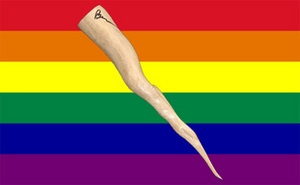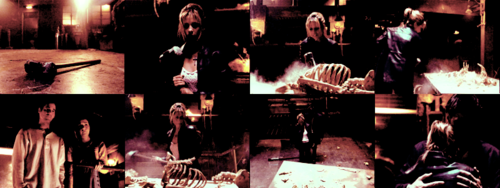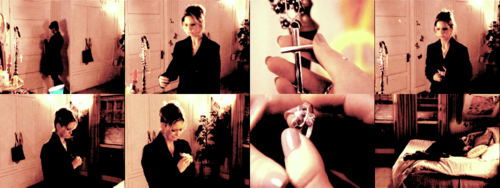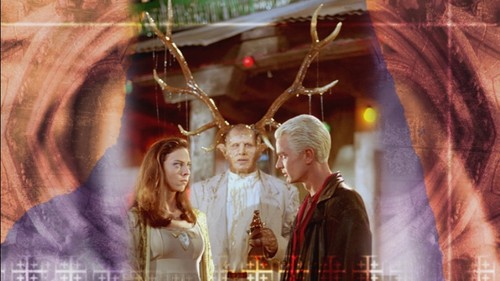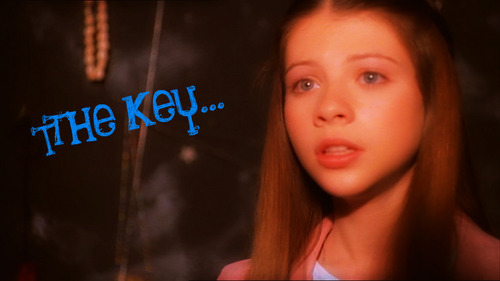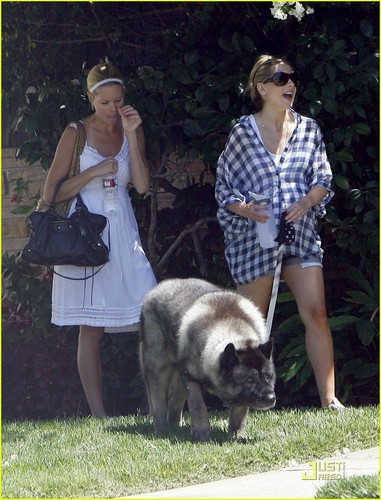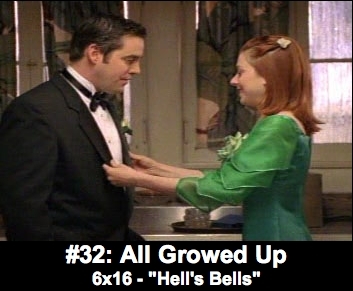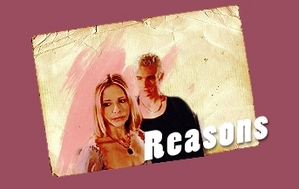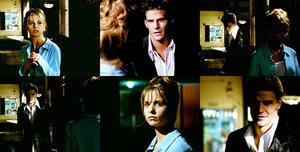Buffy the Vampire Slayer is secara keseluruhan, keseluruhan very gay-friendly with its lesbian romances between Willow and Tara, and later Willow and Kennedy, as well as the minor Larry character in the earlier seasons. Before Willow met Tara, though, the tampil was gay-friendly but mostly in metaphor. There are various allusions to how being a Slayer is like being gay, as well as a minor character (Michael) whose witchcraft seems also a metaphor for being gay.
Buffy serves humanity oleh fulfilling her role as Slayer, a calling linked with womanhood. A potential Slayer first gets her powers during a time of puberty. It is the most important aspect of Buffy’s life, but she must keep it secret to protect those she cares about. Though Buffy is straight, the manner in which she sneaks around to keep her mother from finding out is similar to how a gay person would hide their activities. This is made obvious in the season two episode “Becoming (Part 2)”, in which Buffy is forced to kill a vampire in front of her mother Joyce.
The resulting conversation with a disbelieving Joyce sounds very much like the kind of conversation in which a gay person comes out to their family, complete with lines like “Honey, are anda sure you’re a Slayer?”, “Have anda ever tried not being a Slayer?”, and “It’s because anda didn’t have a strong father figure, isn’t it?”. Joyce adamantly refuses to accept that Buffy’s a Slayer, and the way she does so hits lebih than the obvious assumed insanity of Buffy. Joyce then threatens to disown Buffy if she fulfills her duties as Slayer oleh leaving to go kill Angel, which seems an obvious parallel to what happens with homophobic parents of gay kids. Buffy has to do it, so she saves the world and then leaves for Los Angeles. oleh season three’s “Anne”, Buffy comes back and her mom accepts her.
Later in the season three episode “Faith, Hope, and Trick”, Joyce is delighted to find out Faith is a Slayer too, in the hopes that her daughter no longer has to act as one. When Buffy confronts her about this, Joyce indignantly balasa that she has marched in the “Slayer pride parade”. While Slaying is certainly different from being gay because Buffy is a warrior who puts her life on the line every night, the metaphor is still there. This conflict shows up again in the season three episode “Gingerbread”, which has the secara keseluruhan, keseluruhan theme of bigotry hurting misunderstood outsiders.
“Gingerbread” is one of my favorit episodes. It’s got the mistrust of authority, tampilkan bureaucratic censorship even for a good cause is just harmful, and it’s got a trust in the kids to get things done. The demon antagonist gets into the heads of the Sunnydale adults and makes them paranoid and aggressive enough to start a literal witch hunt. The adults abduct the supernatural kids Amy, Willow, and Buffy and try to burn them at the stake. Buffy tries to appeal to her mother’s sense of reason oleh saying she doesn’t really want to hurt them. “Since when does it matter what I want?” the bewitched Joyce responds. “I wanted a normal, happy daughter. Instead I got a Slayer.” This continues the general theme of Joyce being disappointed that Buffy doesn’t live up to her expectations of how she thinks a daughter should be.
What makes the episode especially relevant is the presence of a warlock kid named Michael, who is targeted because of his association with witchcraft. As the paranoia influence starts to take root, people considered normal start behaving aggressively toward the witchy outcasts. Michael, however, seems particularly harassed because he’s a boy and witchcraft is typically feminine. “Oh, sorry. Did I make anda smudge your eyeliner?” says a boy as he bullies Michael. While Buffy shows up as protector of the small, Cordelia tells her that because of the tense atmosphere she’ll have to cover the witches constantly, referring to Michael as “whatever the boy of witch is”. When the adults go homicidal, Michael is the first one to be attacked—by his dad and his friends. I don’t think it’s a stretch to think of Michael as an example of how people are victimized when they deviate from the standards of gender essentialism.
Both Buffy as a Slayer and Michael as a warlock can be seen as people taking part in a lifestyle considered incompatible with their gender roles. The Slayer is a warrior who seeks out demonic psychopaths to hunt and kill in order to keep innocent people safe. Normally such a role would be held oleh a man both because of average physical strength and because that kind of thing is generally considered to be a man’s duty, whereas women stay at halaman awal and manage the household. Joss Whedon intentionally subverts this expectation to tell a feminist story in which being a warrior can be feminine, but this doesn’t erase the way Buffy is perceived within the show, where she has to challenge current gender norms. Likewise, witchcraft is often portrayed as inherently feminine, and its practitioners are usually female, so Michael is attacked for appearing feminine when as a boy he should not according to sexist and homophobic societal ideals. While technically just sexist with no explicit gay references like with Joyce, the variant of sexism displayed here has always seemed like a gay metaphor to me.
In conclusion, before the explicitly positive portrayal of the gay relationship of Willow and Tara in season four, the sebelumnya seasons contained gay-friendliness in the form of metaphor. Buffy’s being a Slayer and its tension with her mother in particular tampil a metaphor for being gay and having a parent struggle to accept their kid for who they are. In addition, “Gingerbread”’s minor character Michael presents a probable metaphor for a gay boy suffering homophobic violence. Ultimately both examples contribute to Joss Whedon’s feminist message of challenging populer gender roles.
Buffy serves humanity oleh fulfilling her role as Slayer, a calling linked with womanhood. A potential Slayer first gets her powers during a time of puberty. It is the most important aspect of Buffy’s life, but she must keep it secret to protect those she cares about. Though Buffy is straight, the manner in which she sneaks around to keep her mother from finding out is similar to how a gay person would hide their activities. This is made obvious in the season two episode “Becoming (Part 2)”, in which Buffy is forced to kill a vampire in front of her mother Joyce.
The resulting conversation with a disbelieving Joyce sounds very much like the kind of conversation in which a gay person comes out to their family, complete with lines like “Honey, are anda sure you’re a Slayer?”, “Have anda ever tried not being a Slayer?”, and “It’s because anda didn’t have a strong father figure, isn’t it?”. Joyce adamantly refuses to accept that Buffy’s a Slayer, and the way she does so hits lebih than the obvious assumed insanity of Buffy. Joyce then threatens to disown Buffy if she fulfills her duties as Slayer oleh leaving to go kill Angel, which seems an obvious parallel to what happens with homophobic parents of gay kids. Buffy has to do it, so she saves the world and then leaves for Los Angeles. oleh season three’s “Anne”, Buffy comes back and her mom accepts her.
Later in the season three episode “Faith, Hope, and Trick”, Joyce is delighted to find out Faith is a Slayer too, in the hopes that her daughter no longer has to act as one. When Buffy confronts her about this, Joyce indignantly balasa that she has marched in the “Slayer pride parade”. While Slaying is certainly different from being gay because Buffy is a warrior who puts her life on the line every night, the metaphor is still there. This conflict shows up again in the season three episode “Gingerbread”, which has the secara keseluruhan, keseluruhan theme of bigotry hurting misunderstood outsiders.
“Gingerbread” is one of my favorit episodes. It’s got the mistrust of authority, tampilkan bureaucratic censorship even for a good cause is just harmful, and it’s got a trust in the kids to get things done. The demon antagonist gets into the heads of the Sunnydale adults and makes them paranoid and aggressive enough to start a literal witch hunt. The adults abduct the supernatural kids Amy, Willow, and Buffy and try to burn them at the stake. Buffy tries to appeal to her mother’s sense of reason oleh saying she doesn’t really want to hurt them. “Since when does it matter what I want?” the bewitched Joyce responds. “I wanted a normal, happy daughter. Instead I got a Slayer.” This continues the general theme of Joyce being disappointed that Buffy doesn’t live up to her expectations of how she thinks a daughter should be.
What makes the episode especially relevant is the presence of a warlock kid named Michael, who is targeted because of his association with witchcraft. As the paranoia influence starts to take root, people considered normal start behaving aggressively toward the witchy outcasts. Michael, however, seems particularly harassed because he’s a boy and witchcraft is typically feminine. “Oh, sorry. Did I make anda smudge your eyeliner?” says a boy as he bullies Michael. While Buffy shows up as protector of the small, Cordelia tells her that because of the tense atmosphere she’ll have to cover the witches constantly, referring to Michael as “whatever the boy of witch is”. When the adults go homicidal, Michael is the first one to be attacked—by his dad and his friends. I don’t think it’s a stretch to think of Michael as an example of how people are victimized when they deviate from the standards of gender essentialism.
Both Buffy as a Slayer and Michael as a warlock can be seen as people taking part in a lifestyle considered incompatible with their gender roles. The Slayer is a warrior who seeks out demonic psychopaths to hunt and kill in order to keep innocent people safe. Normally such a role would be held oleh a man both because of average physical strength and because that kind of thing is generally considered to be a man’s duty, whereas women stay at halaman awal and manage the household. Joss Whedon intentionally subverts this expectation to tell a feminist story in which being a warrior can be feminine, but this doesn’t erase the way Buffy is perceived within the show, where she has to challenge current gender norms. Likewise, witchcraft is often portrayed as inherently feminine, and its practitioners are usually female, so Michael is attacked for appearing feminine when as a boy he should not according to sexist and homophobic societal ideals. While technically just sexist with no explicit gay references like with Joyce, the variant of sexism displayed here has always seemed like a gay metaphor to me.
In conclusion, before the explicitly positive portrayal of the gay relationship of Willow and Tara in season four, the sebelumnya seasons contained gay-friendliness in the form of metaphor. Buffy’s being a Slayer and its tension with her mother in particular tampil a metaphor for being gay and having a parent struggle to accept their kid for who they are. In addition, “Gingerbread”’s minor character Michael presents a probable metaphor for a gay boy suffering homophobic violence. Ultimately both examples contribute to Joss Whedon’s feminist message of challenging populer gender roles.


